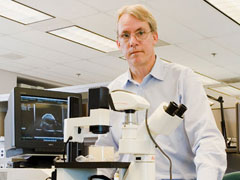Easy Chair
By Jim Oldfield
The Canada Research Chairs (CRC) program secretariat has awarded Dr. Stuart Foster, a senior scientist in imaging research at Sunnybrook Research Institute (SRI), the Tier 1 Canada Research Chair in Ultrasound Imaging. The award brings SRI’s total number of CRCs, allocated through the University of Toronto, to 14—double the total from 2002. Foster’s chair consists of $1.4 million in salary over seven years, plus $268,000 for infrastructure and equipment.
“It’s an honour to have the salary support,” says Foster of the award. “But beyond that, it comes with a significant amount of equipment to support our work. This will definitely allow us to accomplish things we would not have been able to do.” Foremost, the equipment will enable creation of an ultrasound transducer fabrication facility, the technology for which will be unmatched in Canada, making it only the second facility of its kind in North America. “Getting that kind of infrastructure support is extremely difficult in other granting systems, so right now we’re very fortunate to have this funding mechanism in Canada,” says Foster.
The transducer facility, which will be funded through the CRC program in part via the Canada Foundation for Innovation’s Leaders Opportunity Fund (another $400,000 will come from the provincial government, private-sector partners and SRI), will enable Foster and imaging research colleagues to produce next-generation high-frequency arrays—linear sets of ultrasound transducers for in vivo molecular microimaging—and low-frequency arrays for tissue modification therapies in new cancer and cardiac treatments. “It covers a really broad spectrum, not just for my activities but for other [SRI] researchers as well,” says Foster.
The CRC program was established in 2000 by the Government of Canada to attract and retain world-leading researchers. With a goal of establishing 2,000 chairs by 2008, the program had instituted 1,848 chairs as of September 2007. Thirty percent (552) of those recruits had come from outside Canada, and 250 were Canadian expatriates who’d returned home. Dr. Michael Julius, vice-president of research at SRI, says, “The CRC program has been transformative with respect to our capacity to do precisely what its mandate was—attract and retain. It has been a transformative success.”
Foster is a recent recipient of the Manning Foundation’s prestigious Award of Distinction and former associate chair of U of T’s department of medical biophysics. His ultrasound microimaging systems, commercialized by SRI spin-off company VisualSonics, are in use by hundreds of research institutes around the world. Though SRI’s nomination of Foster was based on standard, rigorous metrics for determining research excellence (including number and quality of peer-reviewed academic publications, accumulated research funding and number of trainees), Julius says, “It was a no-brainer.”
Foster, while focused on the near-term collaborative work his new chair will enable, is also enthusiastic about the longer-term implications of the funding boost. He notes the award’s accompanying infrastructure is a huge advantage to newly recruited and future young investigators at SRI, and will likely play a role in making sure the institute can hold on to them down the road by providing compelling and even unique research opportunities. “We’re actually the envy of some international groups out there, to have access to this kind of support,” he says. “I’m excited about how we’re going to be able to take advantage of it.”
Jim Oldfield is the communications coordinator for Sunnybrook Research Institute.
PDF / View full media release »





